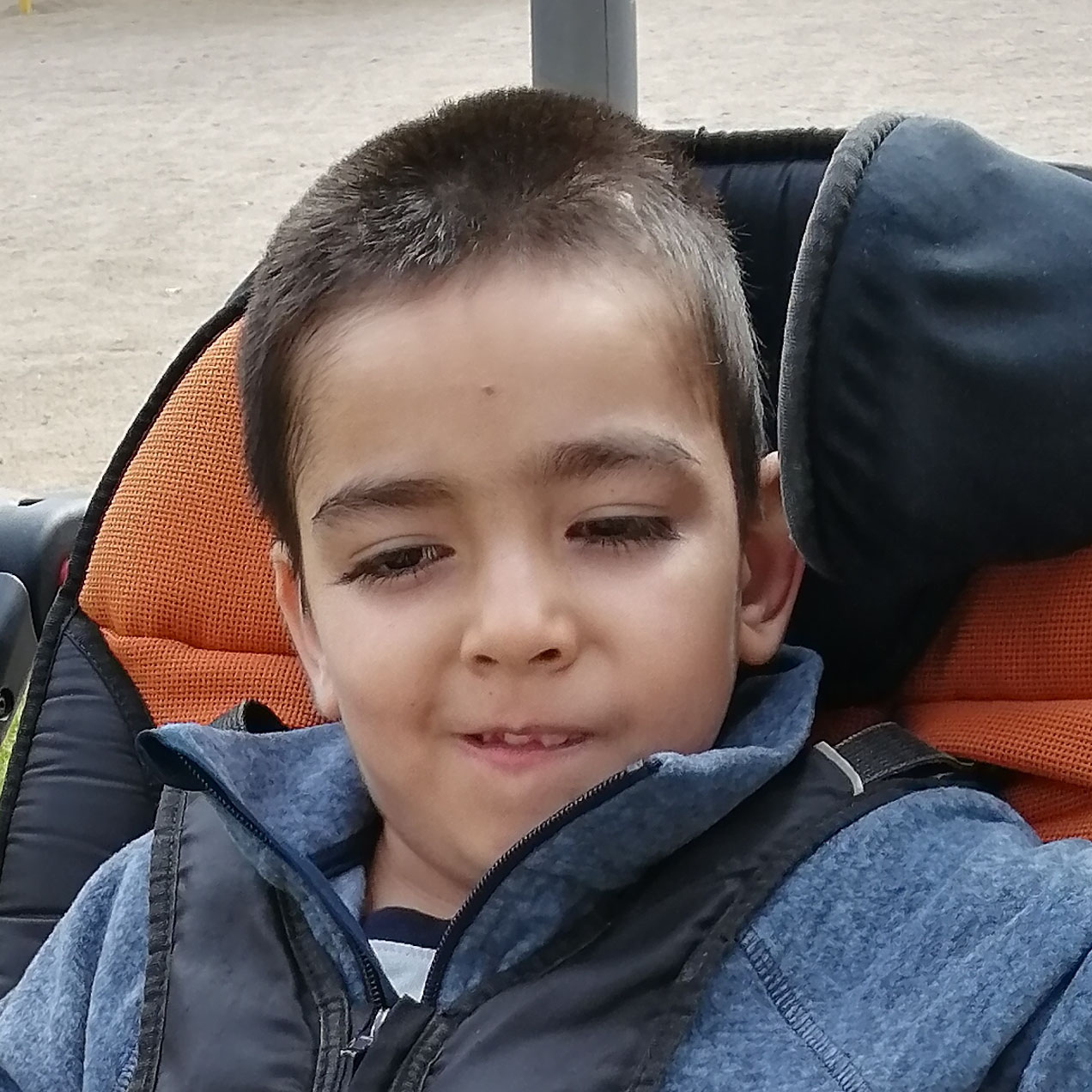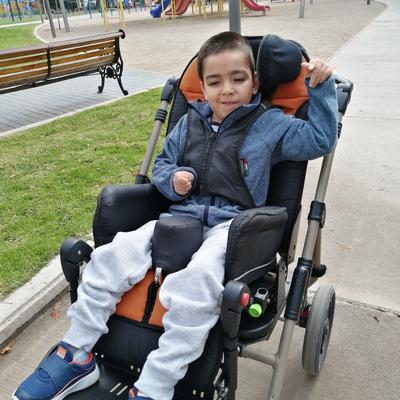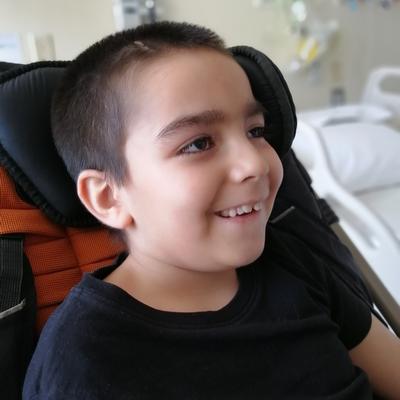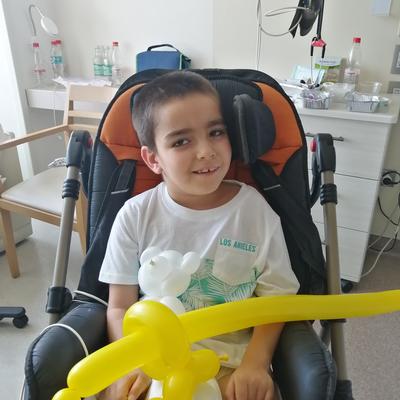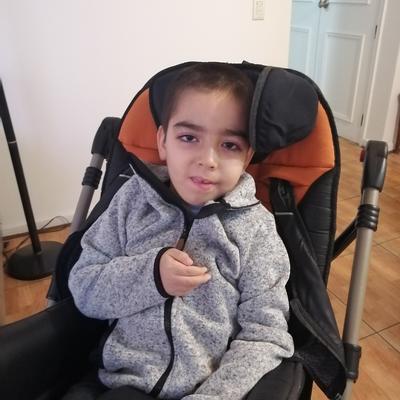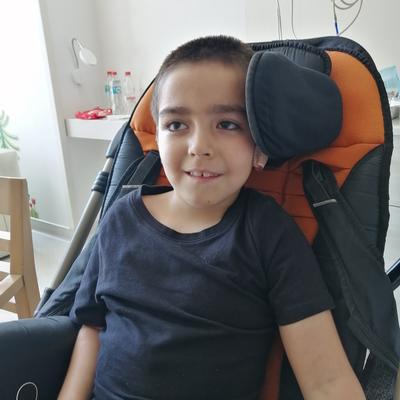Gender and year of birth
Male, 2014
Description
Agustin is the first child of healthy non-consanguineous parents. He was a full-term baby, appropriate for gestational age with normal neonatal period. He was a normal child until the age of 2 months old when he developed severe early generalized dystonia, associated with a severe global delay in psychomotor development and hypotonia. Extensive etiological studies were done, but all resulted negative or inconclusive. The first Brain MRI was done at the age of 3 months and showed atrophy of the basal ganglia, caudate and lenticular nuclei, and decreased volume of the supratentorial white matter. These findings have not progressed in further MRIs during 2017, 2019, 2021 and 2022. Spectroscopy was normal, so as CSF neurotransmitters, electroencephalogram, electromyography and nerve conduction velocity. A whole exome sequencing was performed and resulted in a VUS mutation of the KCNMA1 gene that translates for calcium-modulated K ion channels, reported in patients with epilepsy and paroxysmal dyskinesia. However, it was ruled out as a causal gene because the mother is an asymptomatic carrier and functional studies were also negatives. Through the years, Agustin progressed with poor pharmacological treatment response, therefore, at 3 years old DBS Gpi was done. No major improvements were noticed, but whenever the device was turned off his dystonia got worse. During these last years, at 7 years old, he developed refractory epilepsy with several episodes of status epilepticus.
Symptoms / Signs
- During the first 6 months of being born he presented persistence of the nuchal tonic reflex, exalted primitive reflexes, generalized dystonia (ocular dystonia towards extreme gazes, oromandibular dyskinesias, bruxism and tendency to bite lips and intermittent laryngeal dystonia)
- Left torticollis
- Left extension of upper extremity and ipsilateral lower extremity flexion
- Severe global delay in psychomotor development
- Axial hypotonia.
- Swallowing disorder
- Persistent low weight
- Tonic spasms of the upper extremities
- Several episodes of status epilepticus.
Current Treatments
- Ketogenic diet
- Lacosamide, Valproic acid
- Clobazam
- Vigabatrin
- Clonazepam
- CBD
- Prednisone
- L-carnitine 10%
- Tonaryl-trihexyphenidyl
- Clonidine,
- Melatonin
- Lansoprazole
- Cotrimoxazole and Chloral hydrate 10%
- DBS Gpi
- Gastrostomy.
Prior Treatments
- Trihexiphenidile
- Grifoclobam
- Levodopa-carbidopa
- Gabapentin
- Baclofen
- Botulinum toxin
- For status epilepticus different treaments were used: Lorazepam, Levetiracetam, Phenytoin, Phenobarbital, midazolam, cannabidiol (Convupidiol) and methylprednisolone
Considered treatments
- None
Previously Considered Diagnoses
- Early-onset primary generalized dystonia - DBS Gpi
- Severe global developmental delay
- Refractory epilepsy
- Status epilepticus
- Swallowing Disorder
Genetic Variants of Interest
- WES Trio including mtDNA (2018): VUS in gene KCNMA1 (present in the mother)
- WGS Trio (2021)
- Negative Epilepsy Genetic Panel (2022): VUS in genes ADAR, KCNMA1, PCLO, TBCK.
Siblings, age & gender
Only child, no siblings
Contact
If this participant sounds like you or someone you know, please contact Wilhelm Foundation at info@wilhelmfoundation.org
Bio
Agustin is a boy who is always happy and smiling. He is very affectionate, very patient and enjoys simple things. He really likes going for a walk in his chair and watching television. He likes dinosaurs, cars, balls, and swimming in the pool with his parents.
He is very curious about different noises. It makes him laugh a lot when someone coughs, falls, or makes some strange noise.
He loves going to therapies and sharing with all the children and adults who attend the foundation where he goes. He really enjoys interacting with people, loves being talked to and listening to conversations.
